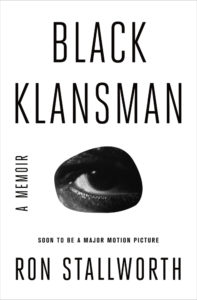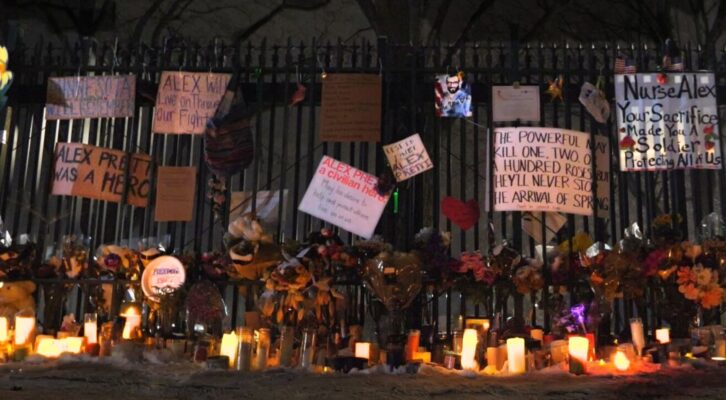The following passage is excerpted from the new memoir The Black Klansman, by Ron Stallworth. In this passage, we learn how Ron Stallworth, Colorado Springs’s first black police officer, convinced his conservative 1970s department to let him run an undercover operation against the Klan. As the passage begins, Stallworth had already established contact with a local member of the Klan named Ken via telephone after seeing an ad in the Colorado Springs paper recruiting new members to join the KKK. As the next step in establishing an investigation, Stallworth then needed to convince his department that he could run an undercover operation and continue to dupe Klan members over the phone, with the assistance of a white undercover body double named Chuck. Stallworth’s memoir is now a major motion picture directed by Spike Lee, to be released this August.
__________________________________
There are certain truths about undercover work that must be acknowledged. First, I broke the most basic rule of all and that was going into a case without a plan of operation. Second, I used my real name instead of my undercover identity—a cardinal sin. Third, having used my real name, I gave the undercover address and phone number without anticipating the possibility that anything would come of the effort.
When this investigation began I had been a police officer for four years, three of which had been spent working undercover narcotics and vice. I was well versed in the basics of how to conduct such investigations; however, in this particular instance I was much too lackadaisical in my initial approach when looking into this matter, and my lapsed judgment allowed me to make a critical error. Fortunately, the people I was dealing with were not, to use an old adage, “the brightest bulbs in the socket,” and my mistakes did not jeopardize the outcome of the investigation. If anything, my failings at the onset, unknown to me, were the seeds of its success.
After getting off the phone with Ken [a local member of the Klan], I immediately contacted my sergeant, Ken Trapp. I told Trapp I wanted to use Chuck, in undercover narcotics, to assist me. Ken was on board, and so I contacted Arthur, who had been promoted to lieutenant in the period between Stokely and the Klan investigation, and requested Chuck’s use for an undercover assignment on November 9. I gave him the details and what I hoped to accomplish with an investigation.
This was to be an intelligence investigation whose purpose would be to learn as much about the growing threat of the Klan in Colorado Springs, and Colorado in general, and to prevent any acts of terror that might result. Anytime during the course of the investigation we could have brought it to an end by arresting several Klansmen for misdemeanor offenses; however, this was not my objective. Had these individuals strayed into the realm of felony offenses we most definitely would have taken them down and brought an end to the investigation. Until that bridge was crossed, I was determined to follow the intelligence trail as far as it would take me and learn as much as possible about the Colorado Springs chapter of the Ku Klux Klan. Now Arthur was a narcotics investigator, and his investigations were intended to result in arrests and gathering evidence for trial. Gathering intelligence was something he did not understand or want to do.
He refused my request.
“Not only do I not have the manpower for this, but the second this Ken hears one of our white officers speaking to him, he’ll know he’s been speaking to a black man on the phone.”
“What does a black man talk like?” I asked.
“Well, you know . . .” Arthur trailed off.
“No, I don’t know. Explain it to me.”
They were blinded by mental prejudices and stereotypes about speech patterns of black Americans of African descent.I was met with dead silence. I had heard this from a few other officers I worked with too. They were blinded by mental prejudices and stereotypes about speech patterns of black Americans of African descent. They treated me like in that scene in Airplane! when June Cleaver stands up and speaks jive, which was what many of them meant by the phrase “talk like a black man.” Another colleague told me when I asked that same question, “You know, shucking and jiving and saying ‘fuck you’ and ‘motherfucker’ all the time.” I immediately burst into laughter at the incongruity of his statement as to its meaning and how that meaning concerned me in the context of the potential success of this investigation.
Arthur and others in the department who had shared these thoughts were essentially saying I would not be able to successfully communicate with these Klansmen over the phone. Being a black man, I would ultimately “shuck and jive” during my conversation, thereby giving away that I was in fact a “black” man; I would, in essence, somehow give in to the urge to say “fuck” and “motherfucker,” and any Klansman I might be speaking with would immediately know he was talking to a “black” man.
Just ridiculous, and in its own way, hilarious at the same time in its absurdity.
His second reason for refusing my request was that this whole idea of the Ku Klux Klan being in Colorado Springs was not to be taken seriously and he would not allow the identification of one of his undercover investigators to be irresponsibly compromised over such foolishness. To him, the ad was a prank at best, and Ken just an angry man no one should worry about.
With the lieutenant’s rejection, I again consulted with Sergeant Trapp, and I made the decision to go over Arthur’s head directly to the chief of police to secure the resources I would need to follow up on the proposed meeting with the local Klan organizer. Sergeant Trapp supported me fully. In terms of my career, this decision was not what one would call a wise one. In regard to the acrimonious relationship I had with Lieutenant Arthur, this major step up the chain of command—bypassing a captain and assistant chief of detectives—was sure to fan the flames of that animosity.
I had only one week to put events in motion for the meeting with the local Klan organizer…The animosity between Arthur and me had developed when I worked for him in narcotics about one year earlier. He was a mentor to me prior to this. Essentially there was a decision that had to be made on a narcotics case and we all took a vote on proposals presented by Arthur and the sheriff’s supervisor. I voted in favor of the sheriff’s position, much to Arthur’s chagrin and anger. He felt that as a CSPD officer I should have sided with him and the city sergeant in the dispute. He did not like the fact that I had expressed my independent mind on an issue against him. From that point forward in our professional relationship, nothing was ever the same between us.
I had only one week to put events in motion for the meeting with the local Klan organizer and quite frankly did not have time to worry about inflaming existing bitter feelings or about department-rank protocol and the damage resulting from bangedup egos. My bottom line was that the lieutenant had issues with me and he would continue to have issues with me, regardless of whether I did this or not. In other words, I had nothing to lose.
Another aspect to the fuel I was about to add to this personal fire between us concerned the lieutenant’s attitude toward our chief of police. He intensely resented the chief, having no respect for him whatsoever because of the politics of his ascension to that rank.
The chief had been promoted only a short time ago and, up to this point, had previously held the permanent civil-service rank of lieutenant, though he was junior in seniority to Arthur, his narcotics counterpart. As a lieutenant, the chief had been in charge of the department’s Community Relations Division, considered a nondescript job within the police hierarchy, and had been quite good at it. Because he had not served in a “frontline” capacity in the same vein as one of his “peers” in the detective or uniformed patrol division, the chief was vilified for having leapfrogged them in the selection process. In their eyes he was deemed unqualified to be chief of police of the Colorado Springs Police Department.
Arthur, the narcotics lieutenant, failed to come to grips with the reality that time had passed him by. During that period the CSPD, like many police departments in the country, began requiring a more educated status for advancement within its rank structure. Traditional issues, such as being more deserving (am I better qualified based on case productivity and seniority) were no longer the paradigm on which a promotional consideration was based. They were being relegated to a secondary status in favor of personal achievement in higher education. One of the specific requisites the promotional board sought when searching for a new police chief was that candidate from within the current rank structure possess at least a bachelor’s degree. The narcotics lieutenant held an associate’s degree compared to the Community Relations lieutenant, who possessed a master’s degree, the only ranking officer in the CSPD with a postgraduate degree at the time.
Sergeant Trapp and I briefed the chief on the action I had taken thus far: the mailed response to the newspaper ad, the telephone conversation with the local Klan organizer, and his stated plans to burn crosses to announce their presence to city residents. The Klan desired to perpetrate a historical act of domestic terrorism, thus increasing white pride and consequentially boost enrollment numbers.
He expressed great interest in our briefing and after a few questions asked if I needed any additional manpower. I requested the use of two surveillance detectives to accompany me on November 9. He then phoned the lieutenant and directed him to give me all the necessary manpower assistance I needed to move this investigation forward.
“I’m the voice, you’re the face.”As expected, Arthur was not pleased by my actions. I, as expected, did not care whether his feelings and ego were upset. In my mind this meeting was a unique opportunity to advance an opening into a group with a long history of domestic terrorism that was now in the process of establishing themselves in my city.
I held my first meeting with Chuck and briefed him on everything involving the investigation.
I told him what I had done. The nature of the phone call, and what Ken and I had discussed.
“They are planning burnings, white-only charity drives, recruitment efforts, and we need to know what else.”
He started laughing. “A black cop infiltrating the Klan? This is nuts. Won’t they know that you’re black?”
“That’s why we’re going to be on the exact same page. I’ll be listening to everything you and he say through the mic. And you’ll be aware of everything I say to him on the phone. I’m the voice, you’re the face.”
“This is just about the craziest thing I’ve heard. I’m in,” said Chuck through his wide smile.
__________________________________
Adapted from Black Klansman © 2018 by Ron Stallworth. Reprinted by permission of FSG. All rights reserved.


















